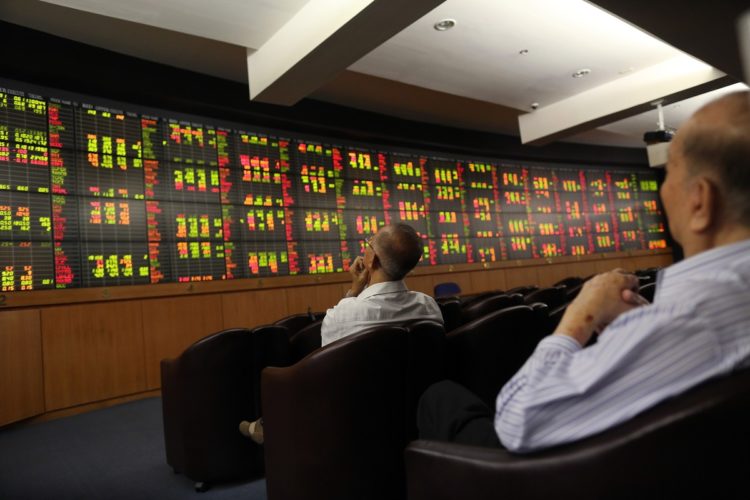Wall Street Faces More Tumult If China Labeled an FX Manipulator

published Oct 10, 2018, 5:41:00 PM, by Katherine Greifeld
(Bloomberg) —
Wall Street is bracing for the prospect that the U.S. uses this month’s semiannual foreign-exchange report to label China a currency manipulator, escalating the trade standoff between the two nations at a time when rising bond yields are already denting riskier assets.
The scenario is viewed as possible — though not probable — given the yuan has tumbled more than 9 percent against the dollar over the past six months, raising speculation that China has been deliberately weakening the currency. The Trump administration is concerned about the yuan’s depreciation, according to a senior Treasury official who spoke Monday on the condition of anonymity, and U.S. Treasury Secretary Steven Mnuchin is facing pressure from the White House to formally impose the designation on China for the first time since 1994.
Such a decision would likely unleash fresh turmoil in global markets just as a surge in Treasury yields has helped spur the biggest selloff in U.S. stocks since February. The strife is compounding weakness in the yuan, with bets mounting that 7 per dollar is around the corner, a level unseen since the financial crisis. With trade relations between Washington and Beijing souring, investors would be remiss to ignore the risks, according to Goldman Sachs Group Inc.
“There’s a higher risk that the Treasury uses the report to reflect its broader trade goals,” said Zach Pandl, co-head of global FX strategy at the New York-based bank. Such an outcome is not his base case, he said. “Markets would interpret it as a further escalation of the bilateral trade dispute, and for the FX market, that has so far been interpreted as a new source of downside risk to global growth.”
Such a move by the Treasury would hit Australia’s dollar particularly hard, given the nation’s close ties to the Chinese economy, according to Pandl. The Aussie has slid more than 9 percent against the greenback in 2018, and is currently trading near its weakest level since early 2016.
Goldman is far from alone sounding the alarm. Ahead of the Treasury’s decision, Citigroup Inc. recommends protecting against further Australian-dollar weakness against the yen, which often strengthens amid acute market stress.
While China doesn’t meet the three official criteria the U.S. currently uses to judge whether a country is a currency manipulator, the Treasury could change the threshold, according to Todd Elmer, Citigroup’s head of Group-of-10 foreign-exchange strategy for Europe, the Middle East and Africa. In August, President Donald Trump said the U.S. was studying its currency manipulation formula.
“There is probably a 50-50 chance that the U.S. will go so far as to outright name China a ‘manipulator’,” Elmer wrote in a report Wednesday. “There is nothing to stop officials from either reverting to earlier criteria, which provide room for more discretion, or introducing new language entirely.”
A formal designation carries no immediate consequences, but the administration may use the label as justification for a fresh round of tariffs, Elmer wrote.
Obvious Tool
A Treasury spokesperson didn’t immediately respond to requests for comment.
The impact of such a designation could reach beyond markets as well. Given China’s relatively modest current-account surplus and lack of intervention in FX markets, there is no basis to name the country a manipulator, according to former U.S. Treasury official Mark Sobel. Doing so could further sour ongoing U.S-China negotiations, he cautioned.
“Lacking merit, it would undermine the longstanding integrity and rigor of the FX report,” said Sobel, U.S. chairman of the Official Monetary and Financial Institutions Forum. “Furthermore, it could very well complicate Secretary Mnuchin’s welcome and laudable efforts to maintain a dialog with senior Chinese leadership.”
While the Treasury has refrained from labeling the Asian nation a manipulator three times under Trump, the U.S.-China trade relationship has deteriorated since the report’s last release in April. The U.S. imposed tariffs of 10 percent on $200 billion of Chinese goods last month, with a promise to increase the levy near year-end. Beijing retaliated, imposing duties on $60 billion of U.S. imports.
“Tensions between the U.S. and China have gone up and you’ve seen Trump utilize other avenues in this ongoing escalation, so I think the use of this as a tool seems obvious,” said Daniel Hui, an analyst at JPMorgan Chase & Co. “Given where we are now in this relationship, I don’t think it’s controversial to say there’s a higher probability that he’ll take this step, this time.”
-With assistance from Liz Capo McCormick and Saleha Mohsin.To contact the reporter on this story: Katherine Greifeld in New York at kgreifeld@bloomberg.net To contact the editors responsible for this story: Benjamin Purvis at bpurvis@bloomberg.net Boris Korby
COPYRIGHT
© 2018 Bloomberg L.P



No Comment